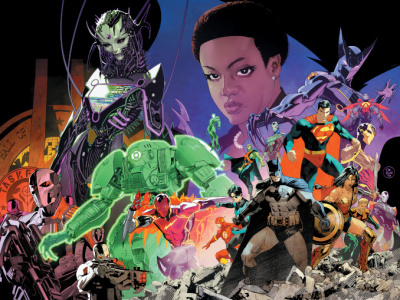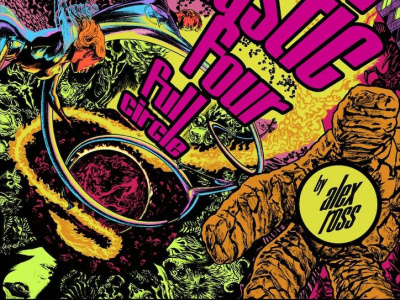Confessions of a Comic Book Guy is a regular column by retailer Steve Bennett of Mary Alice Wilson's Dark Star Books in Yellow Springs, Ohio. This week, Bennett looks at comic strips.
I've been thinking about comic strips this week; actually, I think about them every single day of my life. I love them every bit as much as I do comic books whether they're new (thanks to the magic of the Internet I can read nearly fifty daily syndicated strips, not counting the Web-exclusive ones like PVP and Sinfest) and old (growing up I devoured every book on and collections of strips from the 30s and 40s I could find in our public library). But right now I'm thinking about them in context with two recent comic book-related news stories.
First, starting this Sunday select newspapers will carry a comic strip version of Tokyopop's American manga Peach Fuzz; and second, later this year over 1,000 newspapers will be giving away classic issues of Amazing Spider-Man -- well, half of one anyway (each issue will be split in half). The reason newspapers are doing it are simple enough; they're trying to retard the graying of their circulations by introducing something with guaranteed (they think) youth appeal--comic books.
And it's not the first time they've tried it; supposedly Will Eisner's Spirit appeared in a comic book-like supplement in Sunday newspapers in the 40s because the publishers wanted to take advantage of the popularity of that new fad, comic books.
That's the theory anyway; I'm not exactly sure how it'll work in practice. A manga strip is just as likely to alienate as many older readers (the kind who only make their voices heard when an editor dares to drop either Judge Parker or Mary Worth) as it attracts younger ones.
And while the deal with Marvel could possibly attract an audience as high as ten million, I'm a little puzzled by the material they've chosen. Granted, the first issues of Amazing Spider-Man are classics but I'm afraid they'll seem incredibly dated to today's readers. For a lot of them the early 60s are likely to be as distant a past as the 30s were to me...back in the 60s. What are they planning to do, include footnotes when there are references to The Ed Sullivan Show and The Beverly Hillbillies? And later there are riots on campus to contend with, Mary Jane dancing in a cage, the Viet Nam war, etc.
Wouldn't it have made a lot more sense to serialize Ultimate Spider-Man? The story Marvel decided to implement the Ultimate line in the first place because they had test-marketed the classic Marvel material to kids and found they rejected it for being old-looking.
Or, and this of course is total speculation on my part, is Marvel using Amazing Spider-Man because the material has been reprinted, collected and Essentialized so often that the company isn't really isn't losing anything by effectively giving it away?
Just thinking out loud here.
Comic strips and books of course have a long shared history, comic books having originally started out as collections of comic strips and creators of one frequently trying their hands at the other. Former Batman artist Graham Nolan is currently drawing Rex Morgan M.D. and The Phantom, and if you've ever wondered 'what happened to' Quantum & Woody artist Mark 'Doc' Bright, he's writing and drawing a seven days a week strip called Level Path. But you'd hardly know about this connection by looking at most comic shops.
Which is a shame since comic strip collections can be another revenue stream for your store. There are products out there that could appeal to both your current customer base and their significant others who get dragged along and need something to leaf through other than the back issues boxes. And it's a hardy way of trying a merchandise line without losing your focus on comics.
For those who love older material (like me) there's Little Orphan Annie, Krazy & Ignatz, Prince Valiant, Peanuts and Dennis the Menace (from Fantagraphics) and Dick Tracy, Flash Gordon, and Steve Canyon (from Checker).
For the more intellectual crowd there's Zippy the Pinhead, Matt Groening's Hell series (Love Is Hell, Life Is Hell, etc.), The Boondocks and Tom Morrow's This Modern World.
For the mainstream there are collections of For Better or Worse, Baby Blues, Calvin & Hobbes, Mutts, Zits, etc. And, if you have an account with Baker & Taylor, you could have them on a returnable basis.
Finally, if you've been wondering just how ubiquitous manga was going to get, this Friday on the two hour premiere of the NBC series Book of Daniel (the premise; a drug-addicted Episcopalian minister receives visits from Jesus Christ) one of the many outre plot lines involves the minister's daughter selling pot to finance her manga based on her gay brother's love life.







